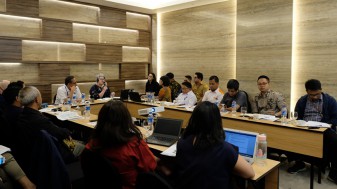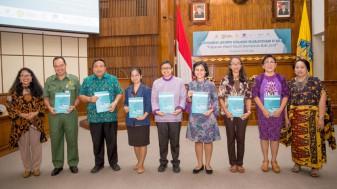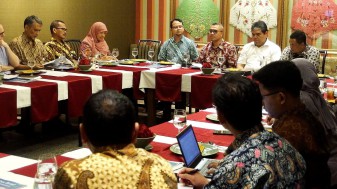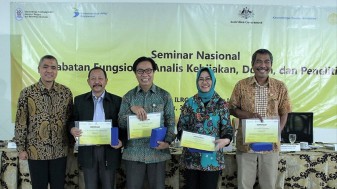Cakra Wikara Indonesia (CWI) is a policy research institute that focuses on socio-political studies with gender perspective, with the main fields of study covering issues of women and politics, political participation, political representation, social movements, and electoral politics. CWI’s scope of work includes research, data collection and publication, as well as training and education programs. CWI conducts various advocacy research, including on stronger and more inclusive public political participation in elections and development planning, community participation in the revision of the General Election Law and political party regulations, as well as women’s representation and women’s leadership in the bureaucracy. CWI’s socio-political research is an effort to produce knowledge that promotes community empowerment and improves the quality of public policies. CWI realizes that research and education work plays a strategic role in promoting participatory, fair and equal political governance.
Promoting Women’s Representation and Leadership
In advocating for women’s representation in various strategic domains of policymaking, CWI compiled results of previous research to ensure data availability and accessibility related to this issue and found that theoretical analyses of political representation and feminist studies in understanding inequality of women’s representation have not been sufficiently equipped with data. CWI then published “Menyoal Data Representasi Perempuan di Lima Ranah” (“Questioning Data on Women’s Representation in Five Domains”), which focused on presenting descriptive data and serve as the beginning of developing further research on the issue of women’s representation.
Discussion on women’s representation in five political domains, namely the legislative bodies, political party management structures, election management institutions, ministerial bureaucracy, and regional leadership, demonstrate sharp disparities in all domains. The number of women in all strategic domains is still below the critical figure of 30 per cent. Exceptions can be found in a number of ministries where the proportion of female civil servants (PNS) is recorded to exceed 30 per cent, but the proportional representation continued to decline when representations in high echelons/positions were traced. This in spite the fact that gender equality and women’s empowerment have formally become part of problem formulation targeted in the framework of national development and affirmative policies at the statutory level have been implemented in three domains, namely the legislature, political party management, and election administrators.
CWI’s research found that efforts to increase women’s representation face three main obstacles, namely barriers to regulation, culture, and women’s capacity. CWI then mapped several directions for policy recommendations. In the domain of legislative institutions, political parties and regional leaders, political parties need to design internal policies to encourage more women to enter strategic positions in political party management and in nomination mechanism. In the election management institution domain, there needs to be an institutional strategy to help reduce barriers for women to access public office.
CWI is also concerned about the issue of women’s representation in the bureaucratic structure domain and encouraging technical policies and programs that help eliminate obstacles to the process of female civil servant promotion. Further on bureaucracy and gender, CWI has conducted research on gender and bureaucracy since March 2017. CWI has collected secondary data on the total number of civil servants in 34 Ministries for 2014 to 2018 from the National Civil Service Agency (BKN). Based on the data traced, a tendency can generally be observed that female civil servants are quite evenly distributed at the beginning of the recruitment, but this rate continues to decline in higher ranks. Although the patterns vary across ministries, generally, the number of female civil servants who hold high positions is quite low across the 34 ministries. Based on the preliminary BKN data that was collected and processed, CWI held a series of discussions on the dynamics of gender inequality and brought together various stakeholders related to the issue of bureaucratic reform in Indonesia. Since late 2020, CWI continued its research on gender and bureaucracy to formulate recommendations based on research findings related to efforts to promote gender-responsive policies in the ministerial bureaucracy.
Strengthen Networks, Use the Momentum
CWI quickly expanded its network with policymakers, sponsors and other stakeholders. In gender and bureaucratic research, CWI maintains a positive relationship by helping BKN in overcoming the issue of women’s representation data managed by BKN. CWI’s research in this area has also enabled BKN to strengthen its network with the State Administration Agency (LAN).
On electoral and democracy issues, CWI built alliances with other Civil Society Organizations (CSOs), including Association for Elections and Democracy (Perkumpulan untuk Pemilu dan Demokrasi – Perludem), Center for Constitutional Studies (Pusat Studi Konstitusi – PUSaKO), Initiative Constitution and Democracy (Konstitusi dan Demokrasi Inisiatif – KODE Inisiatif), Indonesian Voters Committee (Komite Pemilih Indonesia – TePI) and Indonesia Corruption Watch (ICW), to prepare policy summaries that advocate for change to enable the public to provide more input to the vision and mission of electoral candidates. CWI and its allies recommend changes to provisions of the General Election Commission Regulation (PKPU) Number 3/2017 regarding Nominations for the Election of Governors, Bupati and Mayors and PKPU Number 4/2017 regarding Campaigns. CWI is also developing new networks with alternative media partners, namely Indoprogress and Geotimes, to help strengthen their recommendations.
Through this advocacy, CWI established important new institutional relationships with the General Election Commission (KPU) and its Commissioners. In the process of drafting the policy summary above, CWI consulted closely with the KPU. The KPU invited CWI on several occasions to present its findings to discuss KPU regulation revisions, including in public. On this occasion, the KPU Commissioner cited CWI’s research as an important study that provided significant recommendations for improving KPU regulations and stated that the KPU would discuss the matter internally. CWI also disseminated policy briefs to the Ministry of National Development Planning/Bappenas and the Ministry of Home Affairs (MoHA), who responded positively and agreed to discuss the issue in further meetings.
In 2020, CWI’s research and advocacy for the Election Bill focused on six areas, including election concurrency, electoral threshold, and women’s representation. CWI has formed a new network with CSOs that focus on this issue, including Kaylanamitra, Maju Perempuan Indonesia, Fatayat NU, and Aisyiyah. This network actively participated in the design and provided input on CWI’s recommendations regarding the clause on women’s representation in politics. CWI’s recommendation in this regard is to continue affirmative action for political parties to ensure that 30 per cent of candidates are women.
CWI also builds important institutional relationships with the Women’s Parliamentary Caucus of the Republic of Indonesia (KPPRI) in order to support KPPRI’s work to increase women’s political representation. Ahead of the official announcement of the 2019 legislative election results by the Election Administration Commission (KPU), in August 2019, CWI welcomed KPPRI’s invitation to work together in a Public Discussion entitled “Prospects for Women’s Representation in Leadership Positions of Legislative Organizations: Reading the 2019 Election Results”. At the event, CWI presented data on leadership positions in the Indonesian House of Representatives (DPR RI), which were still very minimally filled by women legislative members, and discussed with constitutional law expert, Bivitri Susanti, steps that could be taken to encourage an increase in the number of women in leadership positions of the Indonesian Parliament. CWI was also invited by KPPRI as one of the speakers in the handover ceremony which marked the end of 2015-2019 period of KPP-RI Administration and the election of KPP-RI Administration for the 2020-2024 period in February 2020. In the event, CWI presented its analysis on the dynamics of women representation from the election results over time and again socialized the CWI geospatial database. This database contains comprehensive election data and analysis of women’s candidacy and representation by looking at the votes acquired by each party at various levels of electoral districts spread across 34 provinces which can be used to map political party base areas and efforts to nominate potential women and election results over time. With existing institutional relationships, CWI supports the formation of a joint discourse with KPPRI to encourage women’s representation in drafting revisions to the MPR, DPR, DPD and DPRD Law (UU MD3) and use of disaggregated data in CWI’s geospatial data.
In addition, CWI also produces publications and campaigns that are disseminated through various social media platforms, including Instagram, Twitter, Facebook and YouTube, to reach a wider audience. The publications and campaigns in question include a series of podcast productions (CakraPod) that specifically discuss crucial issues in the Bill on the Elimination of Sexual Violence, the Election Bill, including the issue of women’s representation, as well as digital posters with CWI’s recommendations for the Election Bill.
Support of Knowledge Sector Initiative (KSI)
KSI supports CWI in its efforts to produce policy research and conduct advocacy to strengthen and institutionalize participatory, fair and equitable political governance. The support is mainly in the form of a flexible funding scheme to allow CWI to design and carry out various research and advocacy activities to achieve their vision. KSI also plays a catalytic role that encourages the creation of a road map to direct their policy research journey to strategically influence targeted policies, the many stages of the consultative process with policymakers and related networks, and the inclusion of analyses that promotes gender equality and social inclusion to ensure that policies produced will be useful for all levels of society.






